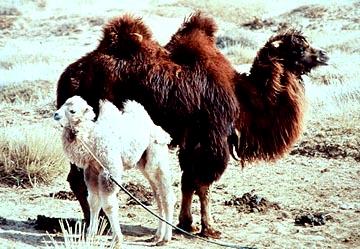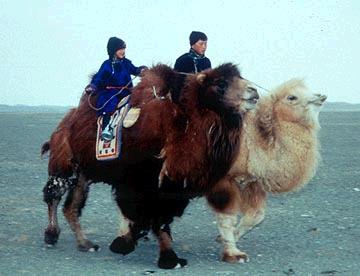The Story of the Weeping Camel


The Story of the Weeping Camel is part film, and mostly documentary. This means that everything that happened in the film actually happened, but some of the footage was reshot for dramatic effect. This, in a sense, is cheating, but given everything that appears on screen, it would be very hard for the cameras to capture everything that happened. The fact that the filmmakers disclosed this is a good thing. The Story of the Weeping Camel is a surprising emotional story about a mother rejecting her newborn. It is a nice film in that it has a timeless, fable-like feel to it. It reaches back into Buddhist lore while remaining firmly planted in the present.
Everything takes place in the barren Gobi Desert in Mongolia. The population is spread thinly over the desert, living days apart from each other. The family in this film raises camels. At the end of the birthing season, one mother has an unusually difficult time delivering her colt. It is finally born, and is a rare white colt. The mother then rejects the colt, despite the many attempts by the family to coax her into letting her colt nurse. It is heartbreaking watching a newborn colt try to nurse, then having the mother kick the colt in the body to drive it away. The mother continuously walks away, with the colt trying to follow.
The only thing that the family can do is to invoke an old ritual. For this they need somebody who can play the violin, and the closest player is days away. They send their sons (one with the unfortunate name of "Dude") away to find this person. According to the ritual, the violin player will play, and the people will sing, and hopefully the mother will accept her child. This is the last resort. If the ritual fails, the colt will die.
Also, according to legend, if the mother accepts her child, she will weep, hence the name of the film. The writer/directors, Byambasuren Davaa (Wunsch) and Luigi Falorni (Fools and Heroes) make no attempt to hide what will happen in the end, but it is still pretty tense. The constant shots of the colt, weakly standing and making sad, forlorn attempts at communication really tug at the heart. There is very little else to the story; it is simple and stark against the barren landscape. There is probably not enough story here to merit a full-length feature film, and that is probably the main tripping point for Davaa and Falorni. They pad the running time with some repetitive shots that slowly begin to lose their power. It's a moving story, but could be more moving if it were shorter.